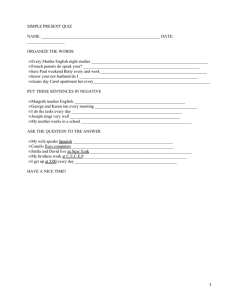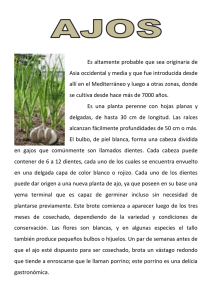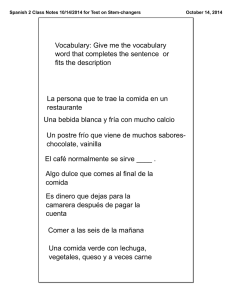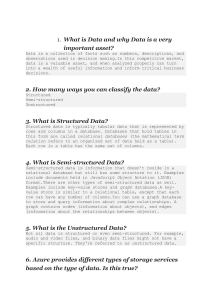STUDY SKILLS - HOW TO REVISE USING A TEXT What`s It Like In
Anuncio
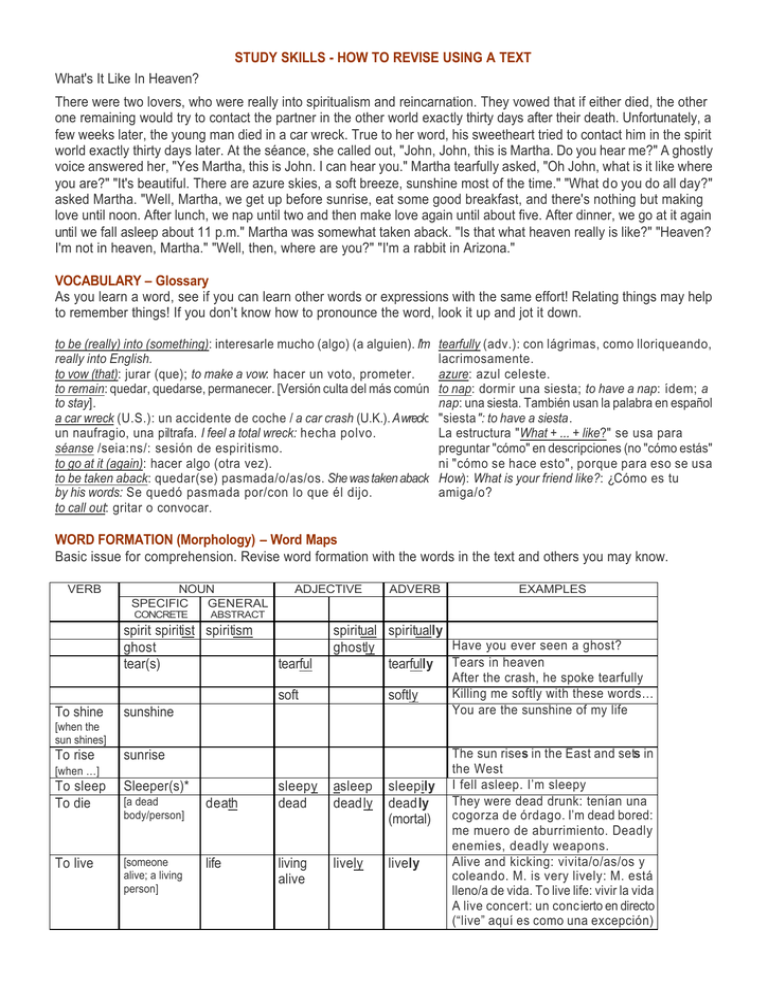
STUDY SKILLS - HOW TO REVISE USING A TEXT What's It Like In Heaven? There were two lovers, who were really into spiritualism and reincarnation. They vowed that if either died, the other one remaining would try to contact the partner in the other world exactly thirty days after their death. Unfortunately, a few weeks later, the young man died in a car wreck. True to her word, his sweetheart tried to contact him in the spirit world exactly thirty days later. At the séance, she called out, "John, John, this is Martha. Do you hear me?" A ghostly voice answered her, "Yes Martha, this is John. I can hear you." Martha tearfully asked, "Oh John, what is it like where you are?" "It's beautiful. There are azure skies, a soft breeze, sunshine most of the time." "What do you do all day?" asked Martha. "Well, Martha, we get up before sunrise, eat some good breakfast, and there's nothing but making love until noon. After lunch, we nap until two and then make love again until about five. After dinner, we go at it again until we fall asleep about 11 p.m." Martha was somewhat taken aback. "Is that what heaven really is like?" "Heaven? I'm not in heaven, Martha." "Well, then, where are you?" "I'm a rabbit in Arizona." VOCABULARY – Glossary As you learn a word, see if you can learn other words or expressions with the same effort! Relating things may help to remember things! If you don’t know how to pronounce the word, look it up and jot it down. to be (really) into (something): interesarle mucho (algo) (a alguien). I'm really into English. to vow (that): jurar (que); to make a vow: hacer un voto, prometer. to remain: quedar, quedarse, permanecer. [Versión culta del más común to stay]. a car wreck (U.S.): un accidente de coche / a car crash (U.K.). A wreck: un naufragio, una piltrafa. I feel a total wreck: hecha polvo. séanse /seia:ns/: sesión de espiritismo. to go at it (again): hacer algo (otra vez). to be taken aback: quedar(se) pasmada/o/as/os. She was taken aback by his words: Se quedó pasmada por/con lo que él dijo. to call out: gritar o convocar. tearfully (adv.): con lágrimas, como lloriqueando, lacrimosamente. azure: azul celeste. to nap: dormir una siesta; to have a nap: ídem; a nap: una siesta. También usan la palabra en español "siesta": to have a siesta. La estructura "What + ... + like?" se usa para preguntar "cómo" en descripciones (no "cómo estás" ni "cómo se hace esto", porque para eso se usa How): What is your friend like?: ¿Cómo es tu amiga/o? WORD FORMATION (Morphology) – Word Maps Basic issue for comprehension. Revise word formation with the words in the text and others you may know. VERB NOUN SPECIFIC GENERAL CONCRETE EXAMPLES tearful spiritual spiritually Have you ever seen a ghost? ghostly tearfully Tears in heaven soft To shine sunshine To rise sunrise To sleep To die Sleeper(s)* [a dead body/person] death To live [someone alive; a living person] life [when …] ADVERB ABSTRACT spirit spiritist spiritism ghost tear(s) [when the sun shines] ADJECTIVE softly sleepy dead asleep deadly sleepily deadly (mortal) living alive lively lively After the crash, he spoke tearfully Killing me softly with these words… You are the sunshine of my life The sun rises in the East and sets in the West I fell asleep. I’m sleepy They were dead drunk: tenían una cogorza de órdago. I’m dead bored: me muero de aburrimiento. Deadly enemies, deadly weapons. Alive and kicking: vivita/o/as/os y coleando. M. is very lively: M. está lleno/a de vida. To live life: vivir la vida A live concert: un conc ierto en directo (“live” aquí es como una excepción) GRAMMAR (Syntax, morphology). Revise the grammar points you have learnt noticing how it is used in a text. • • • • • • • • • • • • "There is", "there are", also with some-, any-, no- quantifiers and compounds. There were two lovers, who were really into spiritualism and reincarnation. There are azure skies, a soft breeze, sunshine most of the time. ...and there's nothing but making love until noon. Pronouns/Adjectives ("either", etc.) They vowed that if either died, the other one remaining would try to contact the partner in the other world exactly thirty days after their death. Verbs followed by infinitive or -ing form: "try" + infinitive. Verbos que cambian de significado según vayan seguidos de infinitivo o de gerundio "try" + infinitivo = intentar (esfuerzos); "try" + gerundio = probar a (experimentos). ...his sweetheart tried to contact him...: su amor intentó ponerse en contacto con él. cf. I had a terrible headache so I tried having a couple of aspirins. "This" for presentations: "This is Martha/John". Asking for descriptions: What + "be" + Subject + like (+ ...)? What's It Like In Heaven? / what is it like where you are? / Is that what heaven really is like? Relative clauses: There were two lovers, who were really into spiritualism and reincarnation. Indirect Speech: "that"-clauses (completivas) They vowed that if either died, the other one remaining would try to contact the partner in the other world exactly thirty days after their death. Fíjate: todo lo que sigue a "vowed" es el CD (they vowed this), lo que pasa es que ese CD contiene una oración subordinada (sustantiva). Direct Speech (Presentación en forma de teatro). [Lover at a seance, trying to contact dead lover] Martha (calling out): John, John, this is Martha. Do you hear me? John (ghostly voice): Yes Martha, this is John. I can hear you. Martha (tearfully): Oh John, what is it like where you are? John: It's beautiful. There are azure skies, a soft breeze, sunshine most of the time. Martha: What do you do all day? John: Well, Martha, we get up before sunrise, eat some good breakfast, and there's nothing but making love until noon. After lunch, we nap until two and then make love again until about five. After dinner, we go at it again until we fall asleep about 11 p.m. Martha (somewhat taken aback): Is that what heaven really is like? John: Heaven? I'm not in heaven, Martha. Martha: Well, then, where are you? John: I'm a rabbit in Arizona. "Can": "I can hear you" = "Te oigo" en inglés se suele decir más con la idea de "te puedo oír"; como "Hablo inglés" (I can speak English) o "No veo" (I can't see!), porque la frase se refiere a una capacidad que se tiene en ese momento o siempre. En la frase "Do you hear me?" podría haber dicho "Can you hear me?". Subordinadas adverbiales de lugar y de tiempo (incl. tema "after", "before", "until": ¿preposición o conjunción?) What is it like where you are? = What is it like there? (lugar) ...we go at it again until we fall asleep about 11 p.m. = we go at it again until Xh (tiempo) They vowed that if either died, the other one remaining would try to contact the partner in the other world exactly thirty days after their death. we get up before sunrise and there's nothing but making love until noon After lunch, we nap until two and then make love again until about five. After dinner, we go at it again until we fall asleep about 11 p.m. Adjetivos: que no cambian según género ni número, que van delante de los sustantivos. "Most (of)": "There are azure skies, a soft breeze, sunshine most of the time." cf. "Most people are nuts” “Most of the people in this class are nuts.”

